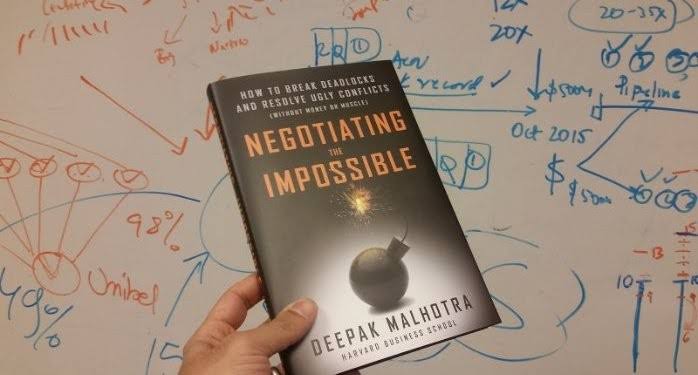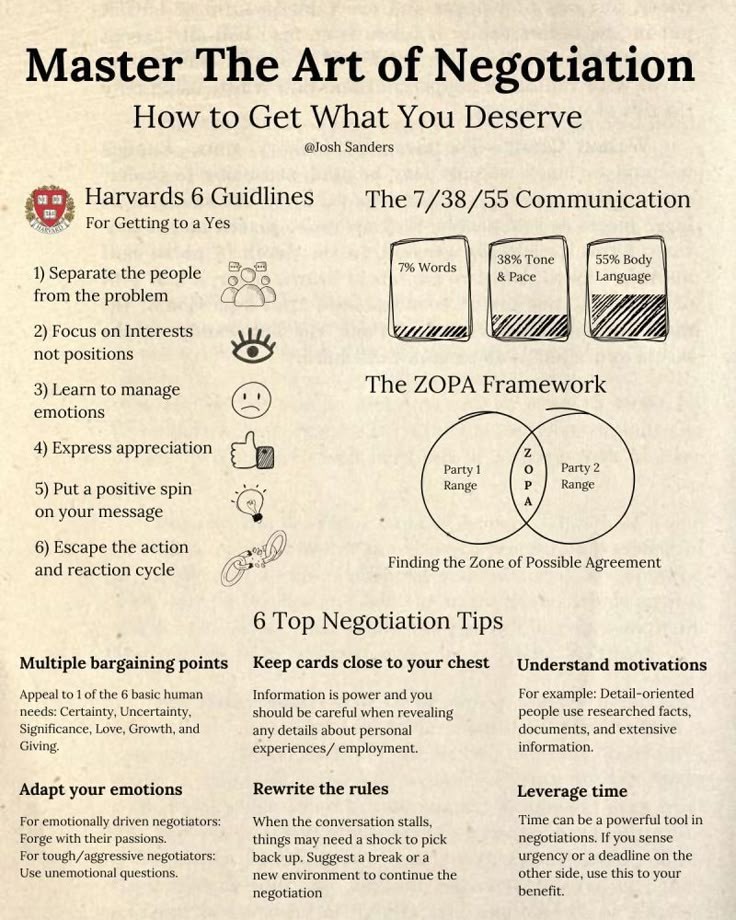Back
SHIV DIXIT
CHAIRMAN - BITEX IND... • 1y
📖 DAILY BOOK SUMMARIES 📖 🔗 DIRECT FREE E-BOOK DOWNLOAD LINK AVAILABLE — https://drive.google.com/file/d/1KNYRMRsVnmJqDSnMTji4QhL0hfYDFhiT/view?usp=drivesdk 🔥 Negotiation genius : Insights 🔥 🚀 20 Lessons 👉 ✨ Deepak Malhotra and Max Bazerman ✨ 1. The Negotiation Genius Mindset • A negotiation genius approaches each discussion with preparation, confidence, and a clear strategy. 2. Preparation is Key • Effective negotiations require understanding your goals, the other party's interests, and potential trade-offs. 3. BATNA (Best Alternative to a Negotiated Agreement) • Know your BATNA to strengthen your position and avoid agreeing to unfavorable terms. 4. Understanding Interests • Focus on the underlying interests of both parties, not just positions, to find mutually beneficial solutions. 5. Creating Value • Look for ways to expand the pie by identifying shared goals or complementary needs. 6. Anchoring Effect • Set the tone of the negotiation by establishing the first credible offer, which often influences the outcome. 7. Dealing with Difficult Tactics • Learn how to recognize and counter manipulation, intimidation, or other aggressive strategies. 8. The Power of Framing • Present information and proposals in ways that appeal to the other party’s priorities and perspective. 9. Emotional Control • Stay calm and composed during negotiations, avoiding emotional reactions that could weaken your position. 10. Building Trust • Establish trust through transparency and credibility, which encourages collaborative problem-solving. 11. Strategic Concessions • Use concessions strategically to signal flexibility while maintaining focus on your key priorities. 12. Cross-Cultural Negotiations • Understand cultural differences in communication and decision-making to navigate international negotiations effectively. 13. Multi-Party Negotiations • Manage complex negotiations involving multiple parties by aligning interests and mediating conflicts. 14. Principled Negotiation • Focus on objective criteria and fairness rather than personal biases or arbitrary demands. 15. Listening Skills • Active listening helps uncover hidden interests, build rapport, and improve the quality of agreements. 16. Negotiating Under Pressure • Stay focused and analytical even in high-stakes or time-sensitive situations. 17. Managing Power Imbalances • Use creativity, preparation, and alliances to level the playing field when negotiating with more powerful counterparts. 18. Ethical Negotiation • Aim for integrity and fairness, ensuring agreements are sustainable and foster positive relationships. 19. Post-Negotiation Tactics • Strengthen agreements through clear documentation and follow-up actions to prevent misunderstandings. 20. Continuous Learning • Reflect on past negotiations to identify lessons and improve your skills for future interactions.

More like this
Recommendations from Medial
Vedant SD
Finance Geek | Conte... • 1y
Day 65: The Art of Negotiation: Securing Deals in Bengaluru Negotiation is a crucial skill for any entrepreneur. Whether it's securing funding, striking partnerships, or closing deals, the ability to negotiate effectively can make all the difference
See More
Account Deleted
Hey I am on Medial • 8m
Founders struggle to acquire good .com domains, spending too much time on negotiations. This "busy work" is an ideal AI task. The tech is ready—email scraping, negotiation bots, transaction APIs—yet no simple AI agent exists to act as a "domain con
See More
Mohammad Ali
Co-founder | Chief P... • 1y
Hi Everyone, We are in discussions with a pre-seed VC in India. I'm reaching out to see if anyone here has recently (or in the past) raised a pre-seed round and can share their experience. Specifically, I'm looking for advice on protecting our inter
See MoreMehul Fanawala
•
The Clueless Company • 1y
Got the job offer? 🎉 First off, congratulations! Now comes the exciting part: negotiating your salary. 1. Do Your Research: Understand the market rate for your role in your industry. This gives you a solid basis for your negotiation. 2. Know Your
See MoreDownload the medial app to read full posts, comements and news.














/entrackr/media/post_attachments/wp-content/uploads/2021/08/Accel-1.jpg)




















